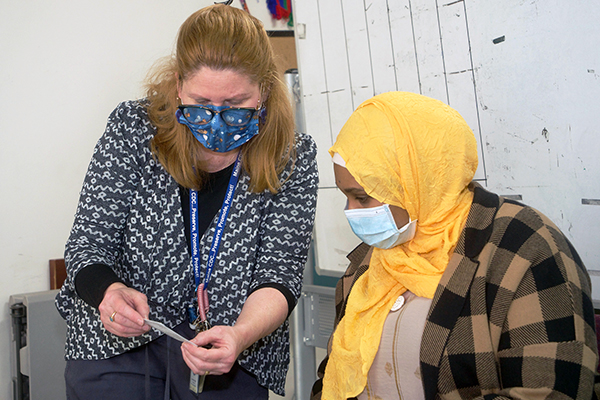The Parallel Pandemic
June 23, 2020

There are various roles that community health workers can adopt in combating the spread of the coronavirus.
Before you read the rest of this blog, take a guess at the following true or false questions:
- Only older people are negatively affected by COVID-19: T/F
- COVID-19 cannot spread in warm weather: T/F
- You can tell if someone is infected by COVID-19: T/F
- The seasonal flu is equally dangerous as COVID-19: T/F
Are you confident in your guesses? According to parallel studies from Cornell University and Pew Research Center, approximately up to 30% of subjects in both studies couldn’t differentiate between fake from real news regarding COVID-19 (depending on the fake news). Statistics like these reveal a parallel pandemic to the novel coronavirus mushrooming across the physical world – what United Nations Secretary General defined as an “infodemic.”
False stories are not new in history, but as the COVID-19 pandemic is equally defined by what we do know versus what we don’t, this information canyon serves as a vacuum for misinformation (and sometimes disinformation). There are, however, institutions working to shed light on COVID-19 truth. Earlier this year, MCD launched its COVID-19 module for community health workers (CHWs) in English and Spanish. This comprehensive, interactive module covers a myriad of topics aimed at best arming CHW’s (although anyone can take it) people in the fight against the novel coronavirus, such as:
- Various roles CHWs can adopt in combating the spread of the coronavirus.
- How to communicate with community members about COIVD-19.
- How the disease spreads and how to prepare and protect themselves, their family and their homes.
- Common symptoms, testing options, and how to safely connect clients to health care services.
- Steps to take when sick and caring for someone who is sick.
- Myths, facts, and reducing COVID-19 stigma.
- Managing stress, anxiety, and how to practice self-care.
Since its inception in late April, the CDC/Public Health Foundation’s Train Learning Network as well as the NNPHI’s Public Health Learning Navigator have posted our training on their e-Learning cataglues and we’ve receivfed accolades from 1,500 registered users from 16 countries across 6 continents. As one user remarked,"“The presentation of material was broad and yet definitive. It covered all of the essential facts and tips necessary for the safety of everyone. It dispelled myths and presented the facts which will be helpful in discussing the ‘fake’ news on the internet.”
MCD’s module is not the only educational course out there for interested CHWs and others. The World Health Organization (WHO) and Johns Hopkins University (JHU) run their own great programs; however, they do not cover mental health and self-care for workers or domestic violence. Additionally, while they are available in other languages, they utilize sub-titles while MCD’s module customizes its training according to the language and culture it targets.
The module is thoroughly researched and centralizes all the facts in an easy-to-understand as well as easy-to-access format. As more information becomes available, the module will update and users are encouraged to return to sharpen their COVID-19 knowledge. Explore the module for yourself and become a warrior in the fight against COVID-19.